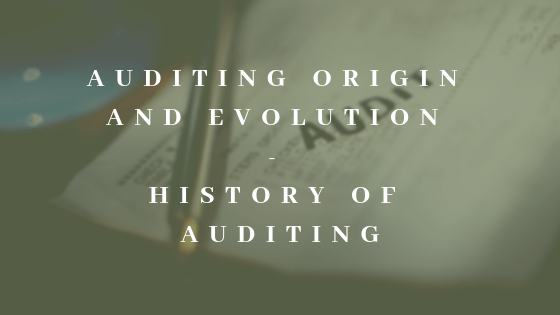In the early stages of civilization, the methods of maintaining accounts were very unrefined. The person used to listen to the accounts read over by an accountant to check them, he was known as the auditor.
History of Auditing
Auditing is as old as accounting, and there are signs of its existence in all ancient cultures such as Mesopotamia, Greece, Egypt, Rome, UK, and India.
Arthashastra by Kautilya detailed rules for accounting and auditing of public finances.
In olden days the key purpose of audits was to gain information about the financial system and records of the business.
However, recently auditing has begun to include non-financial subject areas such as safety, security, information system performance and environmental concerns.
With the non-profit organization and government agencies, there has been an increasing need for performing an audit, examining their success in satisfying mission objectives of the business.
Auditing Origin and Evolution
The auditing origin can be traced back to the 18th century, when the practice of large scale production developed as a result of the Industrial Revolution.
Systems of checks and counter checks were implemented to maintain public accounts as early as the days of ancient Egyptians, Greeks and Romans.
The last decade of the 15th century was a crucial period during which a great impetus was given to trade and commerce by Renaissance in Italy, and the principles of double entry bookkeeping were evolved and published in 1494 at Venice in Italy by Luca Paciolo.
This system of accounts was quite capable of recording all types of mercantile transactions.
The Industrial Revolution of England was another landmark in the history of trade and commerce.
The industrial revolution led to a significant expansion in the volume of trading transactions which compelled the use of more money, and the ordinary trader was enforced to combine with the partnership with others.
Consequently, a big enterprise was framed in the form of partnership firms and joint-stock companies.
This growth of business enterprises before and after the revolution accompanied an improved accounting system.
Besides British Companies made stockholders realize that an independent and impartial audit could well protect their interest.
Such developments had a direct effect on the evolution of the practice of auditing, but the audit of business accounts could not be standard until the 19th century.
A Royal Charter incorporated the Institute of Chartered Accountants in England and Wales on May 11, 1880. The key purpose of this incorporation was to prepare Auditors.
In January 1923, the British Association of Accountants and Auditors got established, and a person could be fully competent to work as a professional auditor after clearing this exam.
